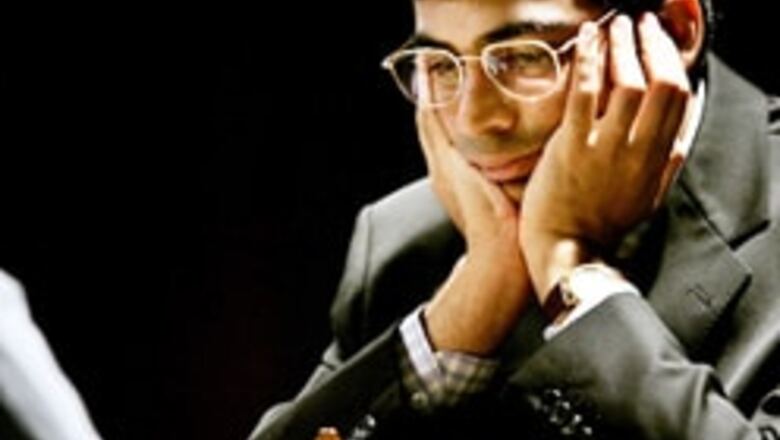
views
New Delhi: A few weeks after he was crowned the World Chess Champion, Viswanathan Anand returned home earlier to a hero's welcome. In an exclusive interview with CNN IBN he describes his journey from being a club-level play to the world chess champ.
In January this year, I was 15 points behind the World Chess Champion. Ivanchuk, leading the points table then, was at 2787 points.
Obviously it was a big gap that seemed extremely difficult to patch in just one game. It normally takes about two or three games to cover that kind of a lag and it gets slightly difficult to focus when you know you’re trailing behind a little bit. But I decided to set the anxiety aside and give the game my best shot. I stopped thinking about being Number I. I even stopped thinking about chasing the points. I thought let’s just play good tournament and leave it at that and that is exactly what I did.
In Linares, I won 25 points relative to the then Number I, thereby swapping places with him. I was now ten points ahead of him. It was something totally unexpected.
That probably was a nice hint that something good was going to happen this year because on the same day, the day I won Linares I became world Number 1 and so it was in Mexico. The day I won in Mexico I crossed 2,800 points mark as well. Let’s say I would have been happy for any one of the three to happen but having all of them happen was just fantastic.
The fantastic reception both in Delhi and in Chennai—it has been like a dream for the last two weeks. It made me think, “My God, chess has really arrived”. So many school children had come there to the airport. It must have been really tough for them as it was pretty hot. Then in Delhi at about 1 pm a big crowd had gathered to receive me. The enthusiasm, the media jostling for space—it was rockstar-ish. I was touched.
Looking back, I had never thought that anything like this would ever happen. As a kid I used to play other sports but it was pretty clear that I had a certain aptitude for chess. I used to play tennis, badminton, table tennis and I used to go out for an occasional swim. However, I never showed any real distinction in any of those games. But with chess it was clear that I was pretty good, at least at the club level. It was nothing sensational.
My chess playing routine was not regimental at all. It was really free flowing. Whenever I felt like it I would pick up a chess book and leaf through it, read endlessly and then put it down. There was no pattern and probably when something is voluntary it is only then when it goes the smoothest.
PAGE_BREAK
My first breakthrough year was 1982. I started sort of consistently beating people with whom the game could go either way and suddenly I went from being a club level player—in a span of a few months—to a qualifier for several prominent tournaments.
I still read up a lot and work a lot on chess voluntarily. It doesn’t feel like hard work. If there’s a match coming you have to get a certain amount of work done. Hard work and discipline are important. However I feel that spontaneity is a fantastic thing for chess.
Coming to chess formats, the trend these days is slightly bent towards Rapid Chess. Seminar Chess has its own challenges but it is important to not specialise in one format. It is clear to me that in a couple of years any good chess player will have to do all of them. Invariably now a days tie-breaks are rapid chess rounds. If that doesn’t produce a winner you go for blitz chess. So unless you’re good in all the forms of the game sooner or later you're going to trip up. It is also important to become as broad based as possible, not in terms of time control but also on the chessboard.
Generally, before I go to a tournament I shut the outside world out. I only got to chess websites to get the games. I don’t read or anything. During that time, Aruna handles all the phone calls and deals with people and so on. The isolation allows me to go deeper in my prep and approach. I find myself thinking about a problem for one or two hours. You should let your mind free to wonder about chess whenever it wants to.
Computers in 2002-2003 were as strong as the best humans. Speed has increased a lot since then. So the trend is clearly in their favour. But still there are certain areas where they are incredibly weak. And that is simply because in those areas brute force calculations just do not work. So perhaps, the key to beating computers is still to aim for the right kind of position.
(As told to Himanshu Singhal)
















Comments
0 comment